
LEVOBUPIVACAÍNA KABI 2,5 mg/mL Solução Injectável e para Perfusão, Genérico
Pergunte a um médico sobre a prescrição de LEVOBUPIVACAÍNA KABI 2,5 mg/mL Solução Injectável e para Perfusão, Genérico

Como usar LEVOBUPIVACAÍNA KABI 2,5 mg/mL Solução Injectável e para Perfusão, Genérico
Introdução
Prospecto: Informação para o utilizador
Levobupivacaína Kabi 2,5 mg/ml solução injetável e para perfusão EFG
hidrocloruro de levobupivacaína
Leia todo o prospecto detenidamente antes de começar a usar este medicamento, porque contém informações importantes para si.
- Conserva este prospecto, porque pode ter que voltar a lê-lo.
- Se tiver alguma dúvida, consulte o seu médico ou enfermeiro.
- Se experimentar efeitos adversos, consulte o seu médico ou enfermeiro, mesmo que se trate de efeitos adversos que não aparecem neste prospecto. Ver secção 4.
Conteúdo do prospecto:
- O que é Levobupivacaína Kabi e para que é utilizado
- O que necessita saber antes de lhe administrarem Levobupivacaína Kabi
- Como lhe administrarão Levobupivacaína Kabi
- Possíveis efeitos adversos
- Conservação de Levobupivacaína Kabi
- Conteúdo do envase e informação adicional
1. O que é Levobupivacaína Kabi e para que é utilizado
Levobupivacaína Kabi pertence a um grupo de medicamentos chamados anestésicos locais. Este tipo de medicamentos é usado para anestesiar partes do corpo ou para aliviar a dor.
Em adultos e adolescentes maiores de 12 anos:
Levobupivacaína Kabi é usado como anestésico local para anestesiar partes do corpo antes de uma cirurgia maior (por exemplo, como epidural em casos de cesárea) e cirurgia menor (como no olho ou na boca).
Também é utilizado para alívio da dor
- após uma cirurgia maior
- durante o parto
Em crianças (menores de 12 anos):
Levobupivacaína Kabi também pode ser utilizado em crianças menores de 12 anos para anestesiar partes do corpo antes de uma operação e para o alívio da dor após uma cirurgia menor, como uma hérnia inguinal.
Levobupivacaína Kabi não foi testado em crianças menores de 6 meses.
2. O que necessita saber antes de lhe administrarem Levobupivacaína Kabi
Não use Levobupivacaína Kabi:
- se é alérgico (hipersensível) à levobupivacaína, a algum anestésico local semelhante ou a qualquer um dos outros componentes deste medicamento (incluídos na secção 6).
- se tem a tensão sanguínea muito baixa.
- para anestesiar uma parte do corpo injetando Levobupivacaína Kabi por via intravenosa.
- para aliviar a dor administrando-a mediante injeção na área ao redor do colo uterino (cérvix) durante a fase inicial do parto (bloqueio paracervical).
Advertências e precauções
Informa ao seu médico antes de lhe administrarem Levobupivacaína Kabi se tiver alguma das condições ou doenças citadas a seguir. Pode necessitar de um maior acompanhamento ou de que lhe sejam administradas doses menores.
- se tiver alguma doença do coração
- se sofre de uma doença do sistema nervoso
- se está fraco ou doente
- se é uma pessoa de idade avançada
- se padece de uma doença hepática.
Uso de Levobupivacaína Kabi com outros medicamentos
Comunique ao seu médico ou enfermeira se está a utilizar, utilizou recentemente ou pode ter que utilizar qualquer outro medicamento. Informe-os, especialmente, se está a tomar medicamentos para:
- batimentos irregulares do coração (como a mexiletina)
- infecções por fungos (como o ketoconazol) pois podem afetar o metabolismo de Levobupivacaína Kabi.
- asma (como a teofilina) pois podem afetar quanto tempo permanece Levobupivacaína Kabi no seu organismo.
Gravidez e lactação
Se está grávida ou em período de amamentação, acredita que possa estar grávida ou tem intenção de engravidar, consulte o seu médico antes de utilizar este medicamento.
Levobupivacaína Kabi não deve ser administrado para aliviar a dor mediante injeção na área ao redor do colo uterino ou cérvix durante o parto (o que se conhece como bloqueio paracervical).
Não se conhecem os efeitos de Levobupivacaína Kabi no feto durante as primeiras fases da gravidez. Por isso, Levobupivacaína Kabi não deve ser utilizado durante os três primeiros meses de gravidez, a não ser que o seu médico o considere necessário.
Não se sabe se a levobupivacaína passa para o leite materno. No entanto, de acordo com a experiência com fármacos semelhantes, espera-se que apenas pequenas quantidades de levobupivacaína passem para o leite materno. A amamentação é, portanto, possível após ter utilizado um anestésico local.
Condução e uso de máquinas
O uso de Levobupivacaína Kabi pode ter um efeito considerável na capacidade para conduzir e utilizar máquinas. Não deve conduzir ou utilizar maquinaria até que tenham passado todos os efeitos de Levobupivacaína Kabi e os efeitos da cirurgia. Antes de sair do hospital, consulte o seu médico ou enfermeira se pode conduzir ou utilizar máquinas.
Levobupivacaína Kabi contém sódio
Este medicamento contém 3,6 mg de sódio (componente principal do sal de cozinha) em cada ml. Isto equivale a 0,18% da ingestão diária máxima de sódio recomendada para um adulto.
3. Como lhe administrarão Levobupivacaína Kabi
O seu médico lhe administrará Levobupivacaína Kabi em injeção através de uma agulha ou através de um pequeno tubo inserido nas suas costas (epidural). Levobupivacaína Kabi também pode ser injetado em outras partes do corpo para anestesiar a área que se quer tratar, como o olho, o braço ou a perna.
O seu médico e enfermeira o vigiarão cuidadosamente enquanto lhe estiverem a administrar Levobupivacaína Kabi.
O seu médico lhe administrará Levobupivacaína Kabi em injeção através de uma agulha ou através de um pequeno tubo inserido nas suas costas (epidural). Levobupivacaína Kabi também pode ser injetado em outras partes do corpo para anestesiar a área que se quer tratar, como o olho, o braço ou a perna.
Dose
A quantidade de Levobupivacaína Kabi que lhe será administrada e a frequência com que o será dependerá de para que é usado e do seu estado físico, idade e peso. Ser-lhe-á administrada a dose mínima que consiga a anestesia na área necessária. A dose será cuidadosamente calculada pelo seu médico.
Quando se use Levobupivacaína Kabi para aliviar a dor do parto ou para um parto por cesárea (via epidural), a dose administrada será controlada cuidadosamente.
Se lhe administrarem mais Levobupivacaína Kabi do que devem
Se lhe administrarem mais Levobupivacaína Kabi do que devem, pode sofrer de formigamento da língua, tontura, visão turva, contração muscular, grave dificuldade para respirar (incluindo paragens de respiração) e até convulsões. Se notar algum desses sintomas, informe o seu médico imediatamente. Em algumas ocasiões, a administração de uma quantidade excessiva de Levobupivacaína Kabi também pode causar hipotensão, bradicardia ou taquicardia e alterações do ritmo cardíaco. Pode que o seu médico lhe administre outros medicamentos para ajudar a deter esses sintomas.
Se tiver alguma outra dúvida sobre o uso deste medicamento, pergunte ao seu médico ou enfermeira.
4. Possíveis efeitos adversos
Como todos os medicamentos, este medicamento pode produzir efeitos adversos, embora nem todas as pessoas os sofram.
Informe imediatamente ao seu médico ou enfermeirase considera que sofre algum dos efeitos adversos que se mencionam a seguir. Alguns dos efeitos adversos de Levobupivacaína Kabi podem ser graves.
Muito frequentes(podem afetar mais de 1 em cada 10 pessoas):
- sensação de cansaço ou fraqueza, dificuldade para respirar, palidez (estes são todos sinais de anemia)
- tensão arterial baixa
- náuseas
Frequentes(podem afetar até 1 em cada 10 pessoas):
- tonturas
- dor de cabeça
- vómitos
- sofrimento fetal
- dor de costas
- febre
- dor pós-operatória
Frequência não conhecida(a frequência não pode ser estimada a partir dos dados disponíveis):
- reações alérgicas graves (hipersensibilidade) que causam grave dificuldade para respirar, dificuldade para engolir, urticária e tensão arterial muito baixa
- reações alérgicas (hipersensibilidade) reconhecíveis por ter a pele vermelha e irritada, espirros, suor excessivo, aumento do ritmo cardíaco, desmaio ou inchaço da face, lábios, boca, língua ou garganta
- perda de consciência
- sonolência
- visão turva
- paragem da respiração
- bloqueio cardíaco ou paragem cardíaca
- formigamento localizado
- língua adormecida
- fraqueza muscular ou tremores
- perda do controlo da urina e das fezes
- paralisia
- convulsões
- formigamento, adormecimento ou outra sensação estranha
- ereção prolongada do pênis, que pode ser dolorosa
- distúrbios nervosos que podem incluir pálpebras caídas, pupilas pequenas (centro negro do olho), cuenca do olho funda, suor e/ou vermelhidão de um lado da face.
Também foram notificados como efeitos adversos, bradicardia, taquicardia e alterações do ritmo cardíaco que se puderam ver num ECG (eletrocardiograma).
Em casos muito raros, alguns efeitos adversos podem produzir-se a longo prazo ou tornar-se permanentes.
Comunicação de efeitos adversos
Se experimentar qualquer tipo de efeito adverso, consulte o seu médico ou enfermeira, mesmo que se trate de possíveis efeitos adversos que não aparecem neste prospecto. Também pode comunicá-los directamente através do Sistema Espanhol de Farmacovigilância de medicamentos de Uso Humano: https://www.notificaram.es. Mediante a comunicação de efeitos adversos, você pode contribuir para proporcionar mais informações sobre a segurança deste medicamento.
5. Conservação de Levobupivacaína Kabi
Mantenha este medicamento fora da vista e do alcance das crianças.
Não utilize este medicamento após a data de validade que aparece no envase após CAD. A data de validade é o último dia do mês que se indica.
O seu médico guardará este medicamento por si.
A solução deve ser usada imediatamente após a abertura.
Não utilize este medicamento se observar partículas dentro da solução.
Os medicamentos não devem ser jogados fora pelos esgotos nem para o lixo. Pergunte ao seu farmacêutico como se livrar dos envases e dos medicamentos que não precisa. Dessa forma, ajudará a proteger o meio ambiente.
6. Conteúdo do envase e informação adicional
Composição de Levobupivacaína Kabi
- O princípio ativo é levobupivacaína (como hidrocloruro)
Levobupivacaína Kabi 2,5 mg/ml solução para injeção ou perfusão: 1 ml de solução contém 2,5 mg de levobupivacaína (como hidrocloruro de levobupivacaína). Cada ampola de 10 ml contém 25 mg de levobupivacaína como hidrocloruro de levobupivacaína.
- Os outros componentes são água para preparações injetáveis, cloreto de sódio e uma pequena quantidade de hidróxido de sódio e ácido clorídrico.
Este medicamento contém um excipiente com efeito conhecido (sódio). Ver a secção 2 para mais informações.
pH: 4,0 – 6,0
Osmolaridade: 271 – 372 mOsmol/l
Aspecto do produto e conteúdo do envase
Este medicamento é uma solução transparente e sem cor, em ampolas de polipropileno em envases blister estéreis. Cada ampola contém 10 ml de solução. É fornecido em envases de 5, 10 ou 20 ampolas.
Pode ser que apenas alguns tamanhos de envase sejam comercializados.
Titular da autorização de comercialização e responsável pela fabricação
Titular da autorização de comercialização:
Fresenius Kabi España S.A.U
C/ Marina 16-18,
08005-BARCELONA
Responsável pela fabricação:
HP Halden Pharma AS
Svinesundsveien 80
1788 Halden
Noruega
Este medicamento está autorizado nos estados membros do Espaço Económico Europeu com os seguintes nomes:
Nome do Estado Membro | Nome do medicamento |
Bélgica | Levobupivacaïne Fresenius Kabi 2.5 mg/ml oplossing voor injectie/ infusie |
França | Levobupivacaïne Kabi 2,5 mg/ml, solution injectable/pour perfusion |
Irlanda | Levobupivacaine 2.5 mg/ml solution for injection or infusion |
Itália | Levobupivacaina Kabi |
Países Baixos | Levobupivacaïne Fresenius Kabi 2.5 mg/ml oplossing voor injectie/infusie |
Portugal | Levobupivacaína Kabi |
Eslovénia | Levobupivakain Kabi 2,5 mg/ml raztopina za injiciranje/infundiranje |
Espanha | Levobupivacaína Kabi 2,5 mg/ml solución inyectable y para perfusión |
Reino Unido | Levobupivacaine 2.5 mg/ml solution for injection/infusion |
Data da última revisão desteprospecto: Outubro 2018
A informação detalhada e actualizada deste medicamento está disponível na página Web da Agência Espanhola de Medicamentos e Produtos Sanitários (AEMPS) http://www.aemps.gob.es/
--------------------------------------------------------------------------------------------------------------------------
Esta informação está destinada apenas a profissionais do sector sanitário:
Levobupivacaína Kabi2,5 mg/ml solução injetável e para perfusão EFG
Instruções de uso / manipulação
Levobupivacaína Kabi 2,5 mg/ml solução injetável e para perfusão é apenas para um uso único. Desechar qualquer solução não utilizada. Utilizar apenas se o envase estiver intacto.
A solução/diluição deve ser inspecionada visualmente antes de seu uso. Apenas devem ser utilizadas as soluções claras sem partículas visíveis.
Deverá escolher um envase de blister estéril quando se requerer uma superfície de ampola estéril. A superfície da ampola não é estéril se o blister estéril estiver danificado.
As diluições de soluções padrão de levobupivacaína devem ser realizadas com solução injetável de cloreto sódico 9 mg/ml (0,9%) utilizando técnicas assépticas.
Comprovou-se que 8,4 µg/ml de clonidina, 50 µg/ml de morfina e 2 - 4 µg/ml de fentanilo e 0,4 µg/ml de sufentanilo são compatíveis com levobupivacaína em uma solução injetável de cloreto sódio 9 mg/ml (0,9%).
Período de validade após a primeira abertura: O produto deve ser utilizado imediatamente.
Período de validade após a diluição:
Comprovou-se a estabilidade química e física em uso de Levobupivacaína Kabi diluída com 9 mg/ml de cloreto sódio (0,9%) até uma concentração final de 0,625 mg/ml e 1,25 mg/ml, respectivamente, durante 30 dias a 2-8ºC ou 20ºC - 25ºC.
Comprovou-se a estabilidade química e física em uso de Levobupivacaína Kabi diluída com 9 mg/ml de cloreto sódio (0,9%) até uma concentração final de 0,625 mg/ml e 1,25 mg/ml, respectivamente,
- com 8,4 µg/ml de hidrocloruro de clonidina, 50 µg/ml de sulfato de morfina e 2 - 4 µg/ml de citrato de fentanilo durante 30 dias a 2-8º C ou 20-22º C.
- com sufentanilo adicionado a uma concentração de 0,4 µg/ml durante 30 dias a 2-8º C ou durante 7 dias a 20-22º C.
Desde um ponto de vista microbiológico, o produto deve ser utilizado imediatamente. Se não for utilizado imediatamente, os tempos de armazenamento para uso e as condições antes de uso são responsabilidade do utilizador e normalmente não devem ser maiores de 24 horas a 2-8ºC, a menos que a diluição e mistura tenham sido preparadas em condições assépticas controladas e validadas.
Levobupivacaína Kabi não deve ser misturado com outros medicamentos, excepto com os mencionados anteriormente. A dissolução com soluções alcalinas como bicarbonato sódio pode dar origem a precipitação.
A experiência sobre a segurança do tratamento com levobupivacaína durante mais de 24 horas é limitada.
Forma de administração
A administração de Levobupivacaína deve ser realizada apenas por um médico que tenha o treinamento e a experiência necessários ou sob a supervisão do mesmo.
Para informação sobre posologia, consultar a Ficha Técnica do produto.
Recomenda-se uma aspiração cuidadosa antes e durante a injeção para prevenir a injeção intravascular.
A aspiração deve ser repetida antes e durante a administração de uma dose em bolo, que deve ser injetada lentamente e em incrementos de dose a uma velocidade de 7,5 - 30 mg/min, enquanto se monitorizam as funções vitais do paciente e se mantém contacto verbal com o mesmo.
Se aparecerem sintomas tóxicos, interrompa imediatamente a injeção.
Levobupivacaína Kabi
(Levobupivacaína)
2,5 mg/ml
Leia as instruções atentamente. Agite até sacar qualquer conteúdo do gargalo.
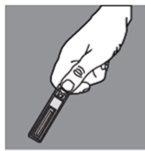
Segure a ampola na palma da mão à altura da cintura. Segure a seta da tampa da ampola entre o dedo polegar e o índice (com o polegar para fora). Torça rápido e bruscamente para si (em sentido contrário às agulhas do relógio).
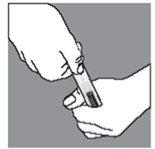
Empurre firmemente o cone Luer da seringa dentro da ampola
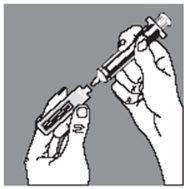
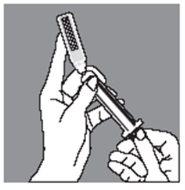
Empurre suavemente a ampola para si com o índice e retire o conteúdo devagar, tendo um cuidado especial no início
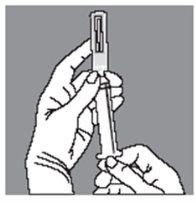
- País de registo
- Substância ativa
- Requer receita médicaSim
- Fabricante
- Esta informação é apenas para referência e não constitui aconselhamento médico. Consulte sempre um médico antes de tomar qualquer medicamento. A Oladoctor não se responsabiliza por decisões médicas baseadas neste conteúdo.
- Alternativas a LEVOBUPIVACAÍNA KABI 2,5 mg/mL Solução Injectável e para Perfusão, GenéricoForma farmacêutica: PERFURAÇÃO INJETÁVEL, 0,625 mg/mLSubstância ativa: levobupivacaineFabricante: Altan Pharmaceuticals SaRequer receita médicaForma farmacêutica: PERFURAÇÃO INJETÁVEL, 1,25 mg/mlSubstância ativa: levobupivacaineFabricante: Altan Pharmaceuticals SaRequer receita médicaForma farmacêutica: INJETÁVEL, 5 mg/mlSubstância ativa: levobupivacaineFabricante: Altan Pharmaceuticals SaRequer receita médica
Alternativas a LEVOBUPIVACAÍNA KABI 2,5 mg/mL Solução Injectável e para Perfusão, Genérico noutros países
As melhores alternativas com o mesmo princípio ativo e efeito terapêutico.
Alternativa a LEVOBUPIVACAÍNA KABI 2,5 mg/mL Solução Injectável e para Perfusão, Genérico em Polónia
Médicos online para LEVOBUPIVACAÍNA KABI 2,5 mg/mL Solução Injectável e para Perfusão, Genérico
Avaliação de posologia, efeitos secundários, interações, contraindicações e renovação da receita de LEVOBUPIVACAÍNA KABI 2,5 mg/mL Solução Injectável e para Perfusão, Genérico – sujeita a avaliação médica e regras locais.














